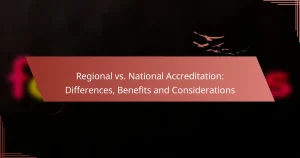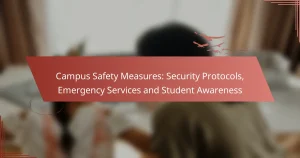Navigating the landscape of higher education programs in the United States can be both exciting and challenging, as it offers a wide array of options tailored to diverse academic and professional goals. From associate degrees to doctoral programs, each path presents unique opportunities and considerations, including program reputation, curriculum, and financial implications. Making an informed choice requires careful alignment of personal interests with career aspirations, ensuring that you select a program that best fits your future ambitions.
Regional vs. National Accreditation: Differences, Benefits and Considerations
Understanding the differences between regional and national accreditation is crucial for students and institutions alike. Regional accreditation is typically limited to specific geographic areas, while national accreditation encompasses institutions across…
Campus Safety Measures: Security Protocols, Emergency Services and Student Awareness
Campus safety measures are essential for protecting students and staff, incorporating various protocols such as access control systems, emergency alerts, and surveillance technology. Emergency services, including campus police and medical…
Accreditation’s Role: Employer Perception and Graduate Opportunities
Accreditation plays a crucial role in shaping employer perceptions and enhancing graduate opportunities in the job market. By validating the quality of education, accredited programs are often seen as a…
Internship Programs: Employability Boost, Skill Development and Networking
Internship programs play a crucial role in enhancing employability by offering practical experience and essential skills that are highly sought after by employers. They not only help individuals apply their…
Federal Financial Aid: Application Process, Eligibility and Deadlines
Applying for federal financial aid begins with the Free Application for Federal Student Aid (FAFSA), which assesses your eligibility for grants, loans, and work-study programs. To qualify, you must meet…
Graduate Programs: Career Change, Specializations, and Networking Opportunities
Graduate programs offer valuable pathways for individuals seeking to change careers, providing essential skills and networking opportunities that facilitate a smooth transition into new fields. By pursuing specializations, professionals can…
Work-Study Programs: Benefits, Eligibility and Job Opportunities
Work-study programs provide students with the chance to earn money while acquiring practical experience in their chosen fields. Designed for those who demonstrate financial need, these programs offer part-time job…
Career Services: Community Colleges, Universities and Support Differences
Career services play a crucial role in supporting students at both community colleges and universities, though their offerings differ significantly. Community colleges focus on practical assistance such as job placement,…
Career Counseling: Adult Learners, Personalized Guidance and Career Paths
Career counseling for adult learners offers invaluable support by providing personalized guidance that aligns with their unique experiences and aspirations. This tailored approach helps individuals navigate career transitions, identify suitable…
Online Learning Platforms: Features, Usability and Support
Online learning platforms have revolutionized education by offering diverse features and user-friendly experiences tailored to individual learning preferences. With options like Coursera, Udemy, and edX, learners can access a wide…
What higher education programs are available in the United States?
The United States offers a diverse range of higher education programs, catering to various academic and professional interests. These programs include associate degrees, bachelor's degrees, master's degrees, doctoral programs, and online options, each serving different educational goals and career paths.
Associate degrees
Associate degrees typically require two years of study and are often offered by community colleges and technical schools. These programs can provide foundational knowledge in a specific field or prepare students for transfer to a four-year institution.
Common areas of study include liberal arts, business, health sciences, and technology. Graduates may enter the workforce directly or continue their education, often with credits that transfer to bachelor's degree programs.
Bachelor's degrees
Bachelor's degrees generally require four years of study and are offered by colleges and universities. These programs provide a comprehensive education in a chosen major, along with general education courses that develop critical thinking and communication skills.
Popular majors include engineering, business administration, psychology, and education. A bachelor's degree is often a minimum requirement for many professional careers and can lead to higher earning potential compared to those with only an associate degree.
Master's degrees
Master's degrees usually require one to two years of study beyond a bachelor's degree and allow for specialization in a specific field. These programs often include coursework, research, and practical experience, preparing graduates for advanced positions or academic roles.
Fields such as business (MBA), education (M.Ed.), and healthcare (MSN) are common. A master's degree can enhance career opportunities and is often necessary for leadership roles or specialized professions.
Doctoral programs
Doctoral programs are the highest level of academic degrees and typically require several years of study, including original research and a dissertation. These programs are designed for those seeking careers in academia, research, or high-level professional practice.
Common doctoral degrees include Ph.D. and professional doctorates like the JD (law) or MD (medicine). Earning a doctoral degree can lead to significant career advancements and opportunities in specialized fields.
Online programs
Online programs offer flexibility and accessibility for students who may not be able to attend traditional classes. Many institutions provide fully online degrees at the associate, bachelor's, master's, and doctoral levels, allowing students to study from anywhere.
When considering online programs, it's essential to ensure the institution is accredited and that the program meets your career goals. Online learning can be particularly beneficial for working professionals seeking to advance their education without disrupting their careers.
How to choose the right higher education program?
Choosing the right higher education program involves aligning your personal interests and career aspirations with the offerings of various institutions. Consider factors such as program reputation, curriculum, and potential career outcomes to make an informed decision.
Consider career goals
Your career goals should be the foundation of your program choice. Identify the profession you aspire to and research the educational requirements for that field. For instance, if you aim to become a licensed engineer, a program accredited by a recognized body is essential.
Think about the skills and knowledge you need to succeed in your desired career. Programs that offer internships or hands-on experience can provide valuable insights and networking opportunities that align with your professional ambitions.
Evaluate program accreditation
Accreditation ensures that a higher education program meets specific quality standards. Look for programs accredited by reputable organizations relevant to your field, as this can affect your employability and eligibility for financial aid.
Check if the institution is recognized by the U.S. Department of Education or equivalent bodies in your country. Attending an accredited program can enhance your resume and provide assurance to employers about the quality of your education.
Assess financial aid options
Understanding financial aid options is crucial when selecting a higher education program. Explore scholarships, grants, and loans available through the institution or external organizations. Many universities offer financial aid packages that can significantly reduce your tuition costs.
Consider the total cost of the program, including tuition, fees, and living expenses. Create a budget to evaluate how much you can afford and what financial assistance you may need. Be cautious of loans with high interest rates, as they can lead to significant debt after graduation.
What are the costs associated with higher education programs?
The costs associated with higher education programs typically include tuition fees, living expenses, and the cost of textbooks and materials. Understanding these expenses is crucial for budgeting and financial planning during your studies.
Tuition fees
Tuition fees are the primary expense for higher education programs and can vary significantly based on the institution and program. Public universities generally charge lower fees for in-state students, while out-of-state students may pay considerably more. Private institutions often have higher tuition rates, sometimes exceeding tens of thousands of dollars per year.
When considering tuition, it's important to factor in potential financial aid options, scholarships, and payment plans that can help manage costs. Always check the specific tuition rates for your chosen program and any additional fees that may apply.
Living expenses
Living expenses encompass housing, food, transportation, and personal costs, which can add up quickly while attending a higher education program. Depending on the location, students may spend anywhere from a few hundred to over a thousand dollars per month on rent alone. Urban areas typically have higher living costs compared to rural settings.
To manage living expenses, consider options like shared housing, meal plans, or public transportation. Creating a monthly budget can help you track and control your spending effectively.
Textbooks and materials
The cost of textbooks and materials can range from a few hundred to several thousand dollars per year, depending on your field of study. Some programs require specialized equipment or software, which can further increase these costs. Used books, digital versions, and library resources can help reduce expenses.
It's advisable to check with your institution for recommended materials and explore options for renting or purchasing used textbooks. Planning ahead can save you money and ensure you have the necessary resources for your courses.
What financial aid options are available for higher education?
Several financial aid options exist for higher education, including federal student loans, scholarships, and grants. Each option has unique characteristics, eligibility requirements, and potential impacts on future finances.
Federal student loans
Federal student loans are government-backed loans that help students pay for their education. They typically offer lower interest rates and more flexible repayment options compared to private loans.
To qualify, students must complete the Free Application for Federal Student Aid (FAFSA). There are different types of federal loans, such as Direct Subsidized Loans, which do not accrue interest while the student is in school, and Direct Unsubsidized Loans, which do.
Scholarships
Scholarships are funds awarded to students based on various criteria, such as academic achievement, athletic ability, or specific talents. Unlike loans, scholarships do not need to be repaid, making them a highly sought-after form of financial aid.
Students can find scholarships through schools, private organizations, and community groups. It's essential to research and apply for multiple scholarships to increase the chances of receiving funding.
Grants
Grants are financial aid awards that do not require repayment, often based on financial need. The most common type is the Pell Grant, which is available to low-income undergraduate students.
To apply for grants, students must also complete the FAFSA. Grants can significantly reduce the overall cost of education, but eligibility can vary based on income levels and other factors.
What are the benefits of pursuing higher education?
Pursuing higher education offers numerous advantages, including improved job prospects and personal growth. Graduates often experience enhanced skills, knowledge, and opportunities that can significantly impact their careers and earning potential.
Increased earning potential
Higher education typically leads to increased earning potential. On average, individuals with a bachelor's degree earn significantly more than those with only a high school diploma, often by tens of thousands of dollars annually.
For example, in the United States, bachelor's degree holders can earn around 60% more than high school graduates over their lifetime. This financial benefit can make the investment in education worthwhile.
Career advancement opportunities
Obtaining a higher education degree can open doors to career advancement that may not be available to those without a degree. Many employers require a college degree for higher-level positions, making it essential for those looking to climb the corporate ladder.
Additionally, advanced degrees, such as master's or professional degrees, can further enhance career prospects and lead to specialized roles in fields like healthcare, engineering, and education.
Networking possibilities
Higher education institutions provide valuable networking opportunities that can benefit students long after graduation. Engaging with professors, industry professionals, and fellow students can lead to connections that may result in job offers or collaborations.
Participating in alumni events and professional organizations can also expand one's network, offering access to job openings and mentorship that are crucial for career development.






